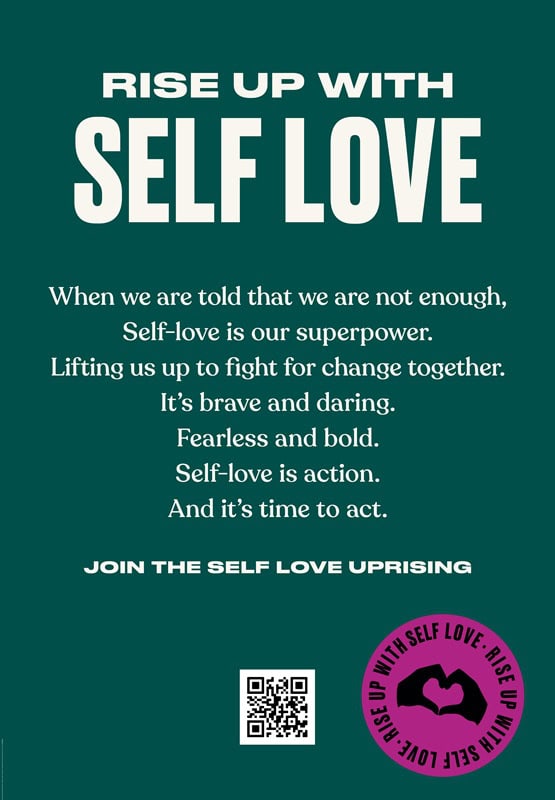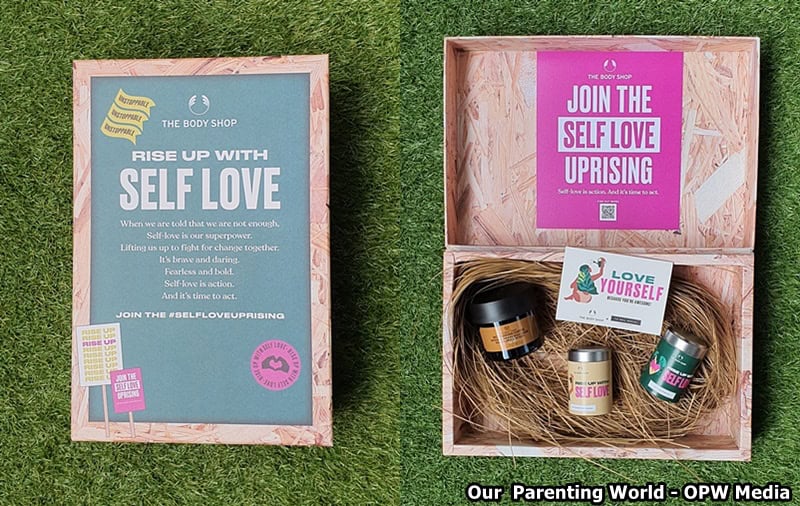What is Self-love? Self-love is many things, but it starts with the recognition and appreciation of our inner worth and value.
The Body Shop has launched a global report and identified a self-love crisis for women around the world, with 1 in 2 women feeling more self-doubt than self-love, and 60 per cent wishing they had more respect for themselves.

Jameela Jamil (L) and Sara Kuburic (R)
The Body Shop Global Self Love Index is a first-of-its-kind study, commissioned to inform a long-term commitment from The Body Shop to always use its voice to build self-esteem. As a result, The Body Shop is launching a global movement called the “Self Love Uprising”, supported by British activist and actress Jameela Jamil and The Millennial Therapist Sara Kuburic. The movement is supported locally by disabilities and mental health advocate Zoe Zora, singer-songwriter and eating disorder warrior, Ming Bridges and creative and community organiser, Irie Aman.
South Korea, Saudi Arabia and France rank lowest for self-love, whereas Denmark, Australia, and the United States rank the highest. The study, designed by The Body Shop and leading market research firm Ipsos, ran between November and December 2020 with over 22,000 people in 21 different countries. The Self Love Index comprises a number of academic measures of self-worth, wellbeing, and happiness, and reveals how age, gender, country, and living standards impact how people feel about themselves.

All the above images credit to The Body Shop
Further key findings of The Self Love Index include:
● Covid-19 has had a slightly more positive impact on women’s self-love than negative
● Heavy users of social media have lower levels of self-love, however they are twice as likely to say they get the emotional support they need, compared to non-users
●The top three causes of low confidence among women are: financial status (32 per cent), followed by not achieving their goals in life (25 per cent) and their looks (23 per cent)
● 47 per cent of women in the UK feel they are ‘no good at all’, compared to 27 per cent of those in Brazil
● 72 per cent of women in the UK often wish their body was different
● 37 per cent of single women, and 38 per cent of minority women, rank in the lowest quartile on the Self Love Index, compared to 21 per cent of married and 25 per cent of non-minority women
● Younger women struggle with self-love. Nearly 50 per cent Gen Z women fall into the lowest self-love category, compared with less than 20 per cent of those that are Gen X or older
Perhaps one of the most surprising findings of the research is that overall, Covid-19 has had a slightly more positive impact on women’s self-love than negative. However, women with low self-love were six times more likely to say Covid-19 had a negative impact on their self-love, and women with financial worries also say Covid-19 had a negative impact, suggesting that the pandemic has compounded self-esteem issues for the most vulnerable women in society. Resilience is also linked to self-love: the higher a person scored, the more likely they were to say they are quick to bounce back from tough times.
One divisive issue when it comes to self-love is social media. Heavy users of social media are twice as likely to say they get the emotional support they need compared to non-users, indicating social media networks may play a valuable role in providing support networks for women. However, the research also shows that heavy social media users have lower levels of self-love, are more likely to compare themselves to others, and are often more unhappy with their body.
The Body Shop Self-love Expert Sara Kuburic said: “For many women, the pandemic – although unpleasant – has offered a space for reflection, reprioritisation, and authenticity. Many have embraced who they are, stripping themselves of pressures to show up or “be” a certain way. But, for those women who struggled with self-esteem prior to Covid-19, they have found the isolation and lack of social support confronting and painful because it robbed them of the external sources that masqueraded as self-esteem. In this increasingly online world too, if a woman is using social media as her primary means of building or outsourcing her self-love and validation, the unrealistic expectations and comparisons can become detrimental and amplify struggles of self-acceptance.
The Body Shop will use the findings from the Index to review and inform its own practices, especially across its marketing and product portfolio. The aim is to spread one million acts of self-love in one year, to create more love and positive change in the world. Annie Chan, Senior General Manager – APAC company markets, said: “As an activist brand, our mission is to fight for a fairer and more beautiful world. In order to create a positive change in the world, we must start with creating a positive change within. We call for people around the world to rise up with self-love, especially in a society that promotes self-doubt and insecurity. We are excited to embark on this journey to drive change individually, in the beauty industry and beyond.”
Actress and activist Jameela Jamil added: “I see the lack of self-love as an emotional pandemic, and one which is sadly hitting younger generations the most. Self love is an inside job, so let’s all take just one positive action towards loving ourselves. As a woman, being proud of yourself and believing you are ‘enough’ as you are, is an act of social and political resistance.”
One Million Acts of Self Love
The Body Shop aims to inspire 1 million acts of self-love in 1 year, to create more love and positive change in the world. It doesn’t matter how big or small, every act can lead to big change. Tips on acts of self-love will be shared on The Body shop online self-love hub and The Body Shop social media channels. Self-love is not merely a concept, it’s an experience. With this understanding, the one million acts movement highlights that self-love involves an action, and that action is at the heart of any change – personal or global.
Methodology of research
This online study was conducted between November 22 and December 8, 2020, staggered across 21 countries. The survey was fielded for an average of 9 days in each country. The survey took about 16 minutes to complete. Certain demographic questions were not asked in some countries due to sensitivities around cultural norms. Respondents included people age 18 and older. The final sample size was 22,619 with approximately 1,000 completed in each country.
 Thank you The Body Shop for the lovely media kit! It’s time to act, let’s join in The Body Shop’s #SelfLoveUprising movement, to spread one million acts of self-love in one year to create more love and positive change in the world!
Thank you The Body Shop for the lovely media kit! It’s time to act, let’s join in The Body Shop’s #SelfLoveUprising movement, to spread one million acts of self-love in one year to create more love and positive change in the world!
To find out more about The Body Shop, please visit its website at https://www.thebodyshop.com/




